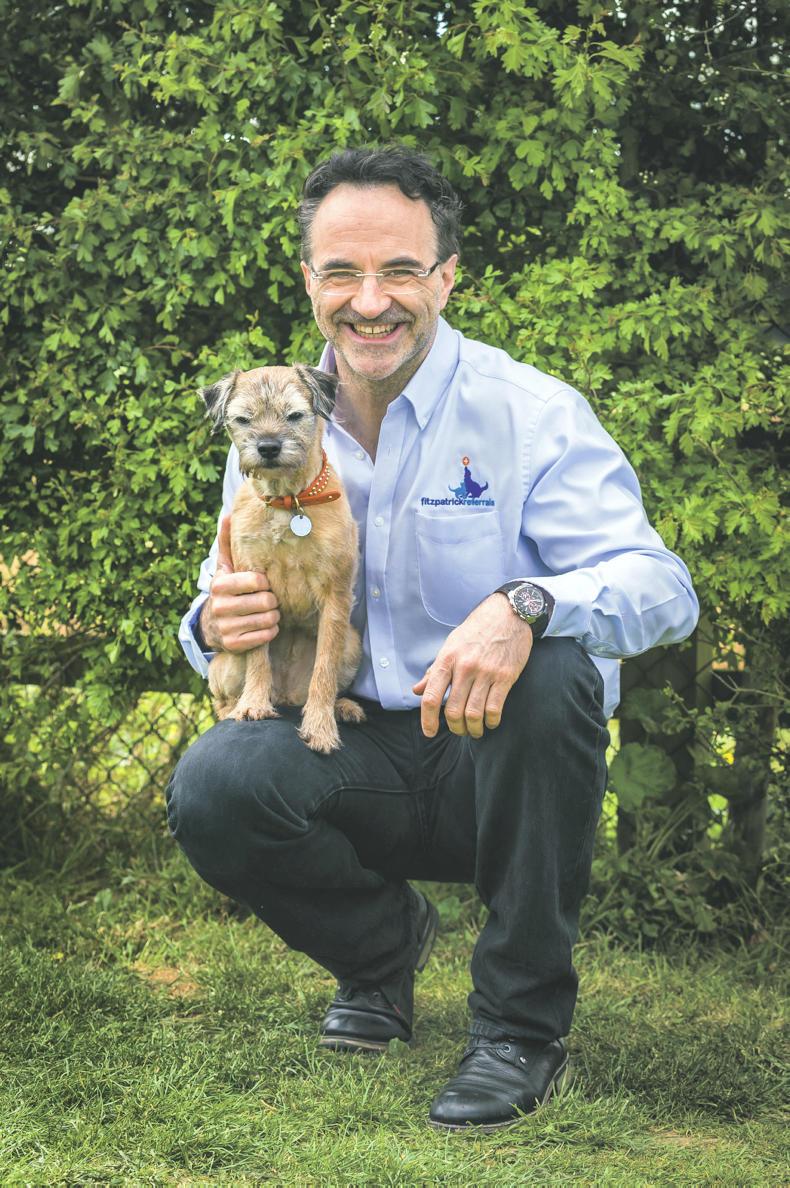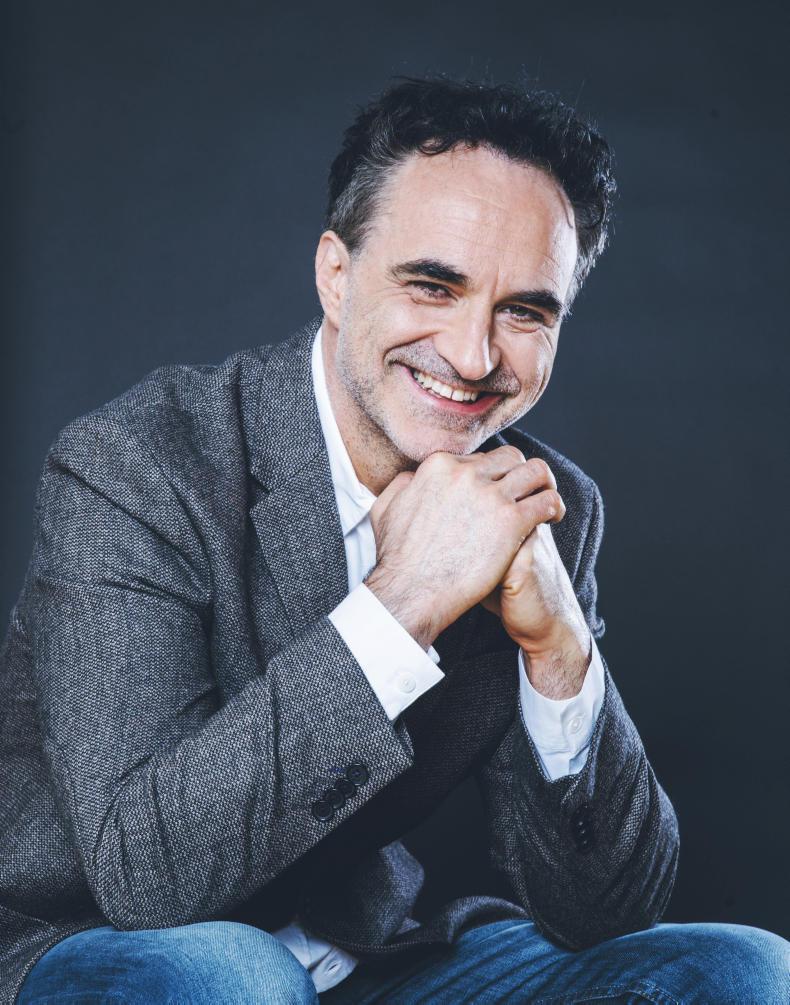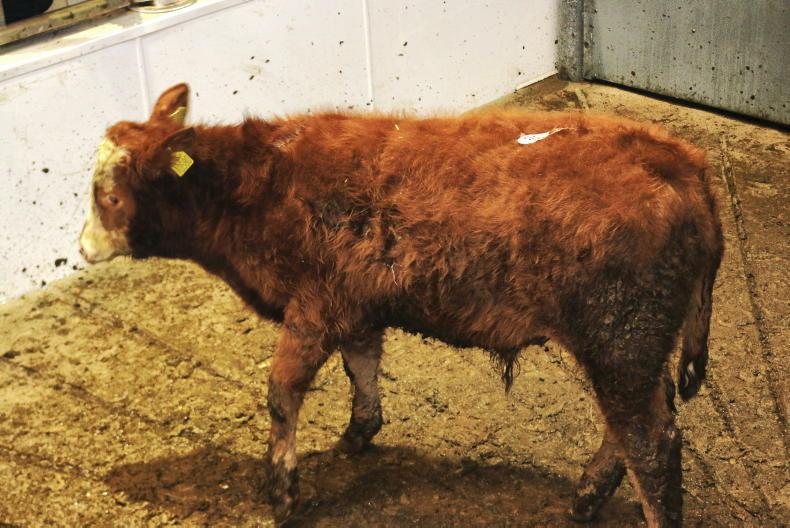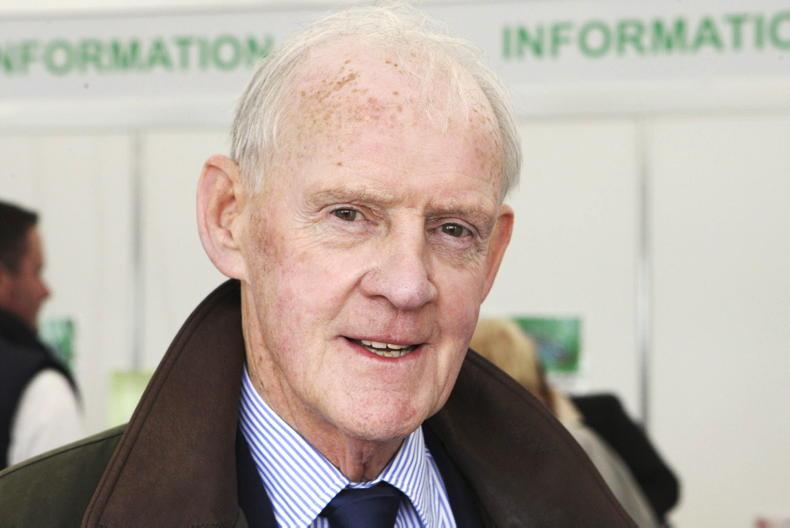My father would be proudest of my being in this publication. He would never say the word “pride”, because my mammy and daddy always used to say that we were “blessed”. They wouldn’t use the word proud, because pride takes a fall.”
Immediately upon meeting him ahead of the signing of his new autobiography in Eason on O’Connell St in Dublin, Noel Fitzpatrick openly impresses upon Irish Country Living just how important being featured in the Irish Farmers Journal would have been to his late father Seán.
From a farm in Ballyfin, Co Laois, Noel extensively explores the influence of this upbringing in Listening to the Animals: Becoming the Supervet, as well as the relationship between himself and his father, who he idolised. His mother Rita, who he is equally enamoured with, still lives in Ballyfin.
“I grew up in the 70s and 80s and before that, it wasn’t the done thing to give your son a hug and say, ‘I’m really proud of you son and I really believe in your future’. It was more, ‘Get in the sheep and get on with the day’,” Noel reflects.

Supervet Noel Fitzpatrick with his dog Kiera.
“I would hope that anyone who has ever felt that yearning for acknowledgement will realise that actually, it is inside you anyway. I am quite sure that daddy would have been over the moon if he knew I was doing this interview with you today, literally over the moon.
“He would have been talking about it at the cattle market to everybody, ‘Noel is in the Irish Farmers Journal, it is fantastic’. But he would never say it to me.
“I think we have to accept that sometimes the words that are unspoken are as valuable as the words that are spoken and we have to accept that we make our own destiny. Your aspirations determine your destiny, even though your origins shape you.”
It is clear straight away speaking with Noel that he is a very profound thinker and he articulates these thoughts incredibly well. Each question asked is answered in two veins, literally and then in the broader context of how it connects to his life mission, which to put simply, is that animal and human medicine would advance in tandem.
Noel is probably better known under his alias ‘Supervet’, which is the title of his TV show on the BBC. First airing in 2014, The Supervet is incredibly popular as it follows Noel’s small animal veterinary practice in Surrey, England.
As the name suggests, Fitzpatrick Referrals is no ordinary setup. Noel is a pioneer in veterinary medicine, although he is humble enough to protest against such a tag. In 2009 he was the first veterinary surgeon to successfully apply an amputation prosthesis to a cat named Oscar, ie a bionic leg. This was recorded by Guinness World Records.
In addition, last October the vet delivered his first live show, Welcome to my World in Dublin’s 3Arena and Belfast’s SSE Arena. This explored his life story and how he came to be the Supervet, much the same as his autobiography.
Recall and release
Listening to the Animals is a very nostalgic read. Noel recounts many events in his life; from being just 10 years old lambing a ewe at night and losing two lambs to present day in his practice.
Minute details are always given and also the emotions attached to each of these experiences.

Noel proves this recall to be something of a talent in the flesh too.
As soon as the 51-year-old walks into Eason, he begins to list associated memories, starting with when he studied veterinary medicine in University College Dublin (UCD).
“I pushed my nose up against the window of Eason many times when I was here in first year of vet school, which would have been 1986.
"I remember looking at an A4 pad that I couldn’t afford because it was top-quality paper. It was narrow-ruled, fine and margined, and I yearned after such top-quality stationary I couldn’t afford it,” he reflects.
“I saw my book in the window when the hardback came out a few months ago and I thought, ‘That’s really great’.
"It does show if you have a dream, if you work towards it, don’t take your eye of the ball and keep believing, it is possible that eventually it can happen.
“It might seem like a little thing, but for me it was a big thing, but I don’t indulge in it though. I think, ‘Oh that’s really nice, it shows that a dream is possible, let’s keep going’.”
Growing up, Noel had his own obstacles to overcome. A more difficult element of his recollections to digest is that of his school years, particularly secondary education when he was subjected to horrific bullying.
Wedgies progressed to him being thrown in a quarry that effluent flowed through.
I don’t look back in anger, I look back with gratitude in that it shaped me into the person I am today
We ask how he feels looking back on this time.
“It was a tough period in my life, it was not enjoyable. I had a tough time because I was perceived as different,” replies Noel.
“I invented a superhero call Vetman that would try save me from the bullies and save me from the feelings I had within myself.
“I don’t look back in anger, I look back with gratitude in that it shaped me into the person I am today. I think this is a universal message that I would like to send out in the book; you can’t live in the past, you have to acquiesce to where you are right now.
“Where I am right now is on a sofa in the upstairs of a bookshop in central Dublin and if I am not here with you, where am I?
"I am living with the bullies of the past or looking forward to a future that may never happen. So I send out love to them and I say, ‘You know what, you were trying to cope with your own demons, whatever they were and you reflected those on me’.”
Changing times
Throughout the memoir, Noel’s affinity with animals rings clear. Working on the farm with his father proved to be a great apprenticeship for his choice of career.
And, although Noel’s fame stems from his work as a small-animal surgeon, before moving to England to focus on such, he was in large-farm animal practice in Ireland, finishing up in the early 90s.

Supervet Noel Fitzpatrick in the operating theatre.
Noel says he left because he was frustrated that he couldn’t change the way things were done. But, he also expresses that he is thankful to have had the experience of working with three different vets in Laois, Offaly and west Cork.
“I was very grateful to have their mentorship and they were magnificent vets.”
During this era, the Supervet’s anecdotes are possibly at their pinnacle, as he recounts epic tales of his farm visits, including sewing his glasses into a heifer after a caesarean!
Since Listening to the Animals was released, Fintan Graham (a regular contributor to the Irish Farmers Journal), who Noel practiced with in Mouthrath, has highlighted the advances in large-animal medicine in Ireland to him.
“Fintan very rightly pointed out to me that veterinary medicine has changed dramatically since I was involved in Ireland in the 80s and early 90s.
"He very much wanted me to emphasise the level of animal care, the level of respect and the level of dedication that has advanced as the years have advanced.
“Also, not to underestimate how Ireland has come on in terms of our attitude to animals and our relationship with animals over the years. He’s quite right.
“I wanted to make a real and tangible difference to the progress of veterinary medicine and in so doing inform both the advance of veterinary medicine and human medicine. I moved on to America and the UK because I wanted to learn as much as I possibly could and make as big a difference as I possibly could.”
Humanimal
And make a difference he most certainly has. In 2014 Noel established a charity called The Humanimal Trust. It aims to fund research to enable animal and human medicine to progress as one. As many human implants and drugs are tested on animals first, and with human and animals sharing a similar physiology, this concept is a no-brainer for Noel.
“The first limb amputation prosthesis I did was in the noughties. So in practice we have been doing that for more than 10 years. Oscar the cat had the world’s first double, but he represents an evolution that has happened since the 1940s,” explains Noel.
“If you look at it logically, shoulder replacements were done on dogs in 1946 to give humans joint replacements.
I am nothing but a messenger for what we should have been doing for many, many years – which is giving animals a fair deal, giving them the same level of technological advantage that they have given us all these years anyway
"Think about it; when I did the shoulder replacement in a dog that really needed it in the late noughties, I was hailed, ‘Oh that’s great, you’re fantastic for doing that’. But it had been done more than 60 years previous.
“If you think about it, that’s nonsense. I am nothing but a messenger for what we should have been doing for many, many years – which is giving animals a fair deal, giving them the same level of technological advantage that they have given us all these years anyway.”
With his practice, The Supervet, a book and live shows, Noel’s life is pretty hectic. Multitasking is a constant for him, even during this interview he pops the dictaphone into the breast pocket of his shirt and gets down on the floor doing stretches.
In another life, Noel admits that he could have stayed in large animal practice in Ireland, farmed part-time and had a family. But ultimately his desire for change drove him to pursue a different path.
“I could have ended up on a windswept hill somewhere in a cottage with some kids and a turnip patch, beetroot and turnips actually. I’d have a couple of goats just to clean up the herbage and make me laugh.
"That could have been my life and maybe that might still happen, who knows?”
My father would be proudest of my being in this publication. He would never say the word “pride”, because my mammy and daddy always used to say that we were “blessed”. They wouldn’t use the word proud, because pride takes a fall.”
Immediately upon meeting him ahead of the signing of his new autobiography in Eason on O’Connell St in Dublin, Noel Fitzpatrick openly impresses upon Irish Country Living just how important being featured in the Irish Farmers Journal would have been to his late father Seán.
From a farm in Ballyfin, Co Laois, Noel extensively explores the influence of this upbringing in Listening to the Animals: Becoming the Supervet, as well as the relationship between himself and his father, who he idolised. His mother Rita, who he is equally enamoured with, still lives in Ballyfin.
“I grew up in the 70s and 80s and before that, it wasn’t the done thing to give your son a hug and say, ‘I’m really proud of you son and I really believe in your future’. It was more, ‘Get in the sheep and get on with the day’,” Noel reflects.

Supervet Noel Fitzpatrick with his dog Kiera.
“I would hope that anyone who has ever felt that yearning for acknowledgement will realise that actually, it is inside you anyway. I am quite sure that daddy would have been over the moon if he knew I was doing this interview with you today, literally over the moon.
“He would have been talking about it at the cattle market to everybody, ‘Noel is in the Irish Farmers Journal, it is fantastic’. But he would never say it to me.
“I think we have to accept that sometimes the words that are unspoken are as valuable as the words that are spoken and we have to accept that we make our own destiny. Your aspirations determine your destiny, even though your origins shape you.”
It is clear straight away speaking with Noel that he is a very profound thinker and he articulates these thoughts incredibly well. Each question asked is answered in two veins, literally and then in the broader context of how it connects to his life mission, which to put simply, is that animal and human medicine would advance in tandem.
Noel is probably better known under his alias ‘Supervet’, which is the title of his TV show on the BBC. First airing in 2014, The Supervet is incredibly popular as it follows Noel’s small animal veterinary practice in Surrey, England.
As the name suggests, Fitzpatrick Referrals is no ordinary setup. Noel is a pioneer in veterinary medicine, although he is humble enough to protest against such a tag. In 2009 he was the first veterinary surgeon to successfully apply an amputation prosthesis to a cat named Oscar, ie a bionic leg. This was recorded by Guinness World Records.
In addition, last October the vet delivered his first live show, Welcome to my World in Dublin’s 3Arena and Belfast’s SSE Arena. This explored his life story and how he came to be the Supervet, much the same as his autobiography.
Recall and release
Listening to the Animals is a very nostalgic read. Noel recounts many events in his life; from being just 10 years old lambing a ewe at night and losing two lambs to present day in his practice.
Minute details are always given and also the emotions attached to each of these experiences.

Noel proves this recall to be something of a talent in the flesh too.
As soon as the 51-year-old walks into Eason, he begins to list associated memories, starting with when he studied veterinary medicine in University College Dublin (UCD).
“I pushed my nose up against the window of Eason many times when I was here in first year of vet school, which would have been 1986.
"I remember looking at an A4 pad that I couldn’t afford because it was top-quality paper. It was narrow-ruled, fine and margined, and I yearned after such top-quality stationary I couldn’t afford it,” he reflects.
“I saw my book in the window when the hardback came out a few months ago and I thought, ‘That’s really great’.
"It does show if you have a dream, if you work towards it, don’t take your eye of the ball and keep believing, it is possible that eventually it can happen.
“It might seem like a little thing, but for me it was a big thing, but I don’t indulge in it though. I think, ‘Oh that’s really nice, it shows that a dream is possible, let’s keep going’.”
Growing up, Noel had his own obstacles to overcome. A more difficult element of his recollections to digest is that of his school years, particularly secondary education when he was subjected to horrific bullying.
Wedgies progressed to him being thrown in a quarry that effluent flowed through.
I don’t look back in anger, I look back with gratitude in that it shaped me into the person I am today
We ask how he feels looking back on this time.
“It was a tough period in my life, it was not enjoyable. I had a tough time because I was perceived as different,” replies Noel.
“I invented a superhero call Vetman that would try save me from the bullies and save me from the feelings I had within myself.
“I don’t look back in anger, I look back with gratitude in that it shaped me into the person I am today. I think this is a universal message that I would like to send out in the book; you can’t live in the past, you have to acquiesce to where you are right now.
“Where I am right now is on a sofa in the upstairs of a bookshop in central Dublin and if I am not here with you, where am I?
"I am living with the bullies of the past or looking forward to a future that may never happen. So I send out love to them and I say, ‘You know what, you were trying to cope with your own demons, whatever they were and you reflected those on me’.”
Changing times
Throughout the memoir, Noel’s affinity with animals rings clear. Working on the farm with his father proved to be a great apprenticeship for his choice of career.
And, although Noel’s fame stems from his work as a small-animal surgeon, before moving to England to focus on such, he was in large-farm animal practice in Ireland, finishing up in the early 90s.

Supervet Noel Fitzpatrick in the operating theatre.
Noel says he left because he was frustrated that he couldn’t change the way things were done. But, he also expresses that he is thankful to have had the experience of working with three different vets in Laois, Offaly and west Cork.
“I was very grateful to have their mentorship and they were magnificent vets.”
During this era, the Supervet’s anecdotes are possibly at their pinnacle, as he recounts epic tales of his farm visits, including sewing his glasses into a heifer after a caesarean!
Since Listening to the Animals was released, Fintan Graham (a regular contributor to the Irish Farmers Journal), who Noel practiced with in Mouthrath, has highlighted the advances in large-animal medicine in Ireland to him.
“Fintan very rightly pointed out to me that veterinary medicine has changed dramatically since I was involved in Ireland in the 80s and early 90s.
"He very much wanted me to emphasise the level of animal care, the level of respect and the level of dedication that has advanced as the years have advanced.
“Also, not to underestimate how Ireland has come on in terms of our attitude to animals and our relationship with animals over the years. He’s quite right.
“I wanted to make a real and tangible difference to the progress of veterinary medicine and in so doing inform both the advance of veterinary medicine and human medicine. I moved on to America and the UK because I wanted to learn as much as I possibly could and make as big a difference as I possibly could.”
Humanimal
And make a difference he most certainly has. In 2014 Noel established a charity called The Humanimal Trust. It aims to fund research to enable animal and human medicine to progress as one. As many human implants and drugs are tested on animals first, and with human and animals sharing a similar physiology, this concept is a no-brainer for Noel.
“The first limb amputation prosthesis I did was in the noughties. So in practice we have been doing that for more than 10 years. Oscar the cat had the world’s first double, but he represents an evolution that has happened since the 1940s,” explains Noel.
“If you look at it logically, shoulder replacements were done on dogs in 1946 to give humans joint replacements.
I am nothing but a messenger for what we should have been doing for many, many years – which is giving animals a fair deal, giving them the same level of technological advantage that they have given us all these years anyway
"Think about it; when I did the shoulder replacement in a dog that really needed it in the late noughties, I was hailed, ‘Oh that’s great, you’re fantastic for doing that’. But it had been done more than 60 years previous.
“If you think about it, that’s nonsense. I am nothing but a messenger for what we should have been doing for many, many years – which is giving animals a fair deal, giving them the same level of technological advantage that they have given us all these years anyway.”
With his practice, The Supervet, a book and live shows, Noel’s life is pretty hectic. Multitasking is a constant for him, even during this interview he pops the dictaphone into the breast pocket of his shirt and gets down on the floor doing stretches.
In another life, Noel admits that he could have stayed in large animal practice in Ireland, farmed part-time and had a family. But ultimately his desire for change drove him to pursue a different path.
“I could have ended up on a windswept hill somewhere in a cottage with some kids and a turnip patch, beetroot and turnips actually. I’d have a couple of goats just to clean up the herbage and make me laugh.
"That could have been my life and maybe that might still happen, who knows?”












SHARING OPTIONS